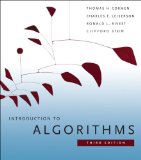RANDOM(a.b) is a random number generator that generates integers between a and b (inclusive), all equally likely.
Assuming we have an implementation of RANDOM(0.1), how can we implement RANDOM(a.b) - i.e. given we have a function that returns 0 OR 1 both with a probability of 1/2, how can we implement a function that returns integers from a to b (b > a), all with a probability of 1/n, where n = (b-a+1)
Source : Cormen - Problem 5.1-2 (randomized algorithms)
Similar problem :
At a restaurant, how can Veronica choose one out of three desserts with equal probability with the help of a coin?
Its on Gurmeet's site here http://gurmeetsingh.wordpress.com/2008/09/12/puzzle-tossing-with-one-third-probability/
skip to main |
skip to sidebar
"Gebo" means to "give and take". This is my attempt to share the knowledge & experience with the community. Focus on Puzzles, Algorithms, Problem Solving, Java & other Technical Discussions.
About Me
Search Gebo
Share & Subscribe
Books & Knowledge Base @ Amazon
Links


|
| Buttons reused from http://www.webfruits.it/freebies.htm and http://mysocialbuttons.com/ |
Labels / Tag
algorithms
(15)
amazon
(3)
antivirus
(1)
arithmetic series
(1)
array
(5)
backtracking
(1)
bash
(1)
basics
(1)
binary trees
(1)
brindavan garden
(1)
bulb
(1)
C++
(1)
callback
(1)
clam
(1)
clamav
(1)
clock
(1)
CLRS
(2)
cormen
(3)
data structures
(1)
duplicate
(1)
easymock
(1)
education
(1)
excel
(1)
freshclam
(1)
hanoi
(1)
hashing
(1)
httpclient
(1)
humor
(1)
induction
(1)
interview question
(9)
irrational
(1)
Java
(5)
jmockit
(1)
learning
(1)
level_easy
(1)
linux
(3)
logger
(1)
macro
(1)
madhur
(2)
mathematics
(5)
matrix
(1)
microsoft
(6)
mock
(2)
mockito
(2)
mysore
(1)
networking
(1)
OCW
(1)
odd man out
(1)
oocalc
(1)
OOTB
(1)
pattern
(1)
Persistent
(1)
probability
(2)
problem
(1)
problem solving
(17)
proxy
(1)
proxy selector
(1)
puzzle
(5)
quote
(1)
randomized
(1)
recurrsion
(2)
repeating
(1)
resolution
(1)
reverse
(1)
riddle
(5)
road trip
(1)
script
(1)
search
(2)
shell
(1)
shell script
(1)
socks
(1)
solaris
(1)
solved
(1)
sort
(3)
stock
(1)
strategy
(1)
subversion
(1)
summation
(1)
svn
(1)
switch
(1)
tanwani
(2)
TDD
(2)
technology
(2)
theorem
(1)
timer
(1)
todo
(1)
travel
(1)
trees
(1)
tutorial
(1)
unimodal
(1)
unit test
(2)
walk the bridge
(1)
warmup
(1)
water jugs
(1)
windows
(1)
xkcd joke
(1)
© Madhur Kumar Tanwani
All material on this page, is free to use as long as references to the original source is maintained and credits are given to this website as one of the sources. Few clicks on the Ads on this page will help too :)
All material on this page, is free to use as long as references to the original source is maintained and credits are given to this website as one of the sources. Few clicks on the Ads on this page will help too :)










3 comments:
anand kishore said...
maybe this works for the *equal probability of choosinf n numbers* problem.
Assuming we have RAND(0,1).
And we have N numbers.
(1) Run RAND(0,1) N times.
(2) Add up all the outputs of RAND(0,1) generated above). This is nothing but an addition of all 1's generated.
(3) Use this sum as the index of the number to pick from N.
this would not work since the sum follows binomial distribution, thus don't have equally like chance
Thanks for sahring a informationProbability Generator.
Post a Comment